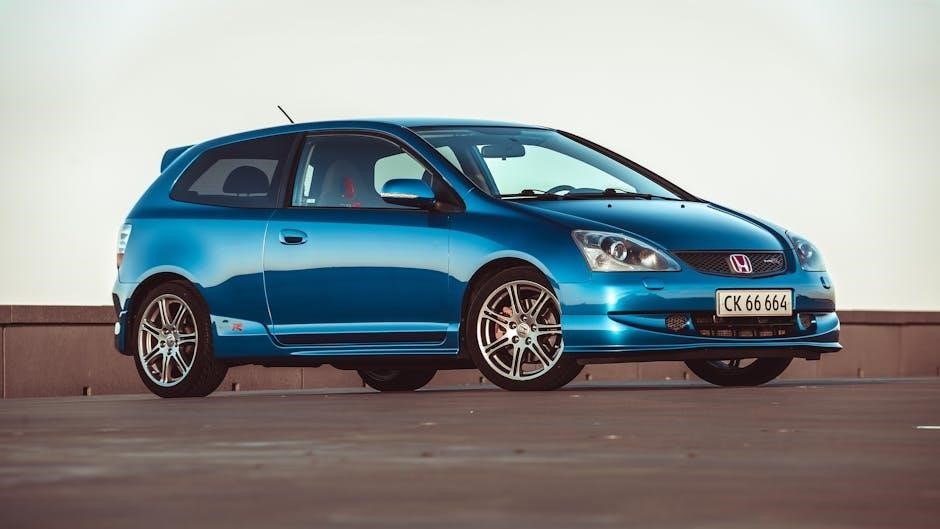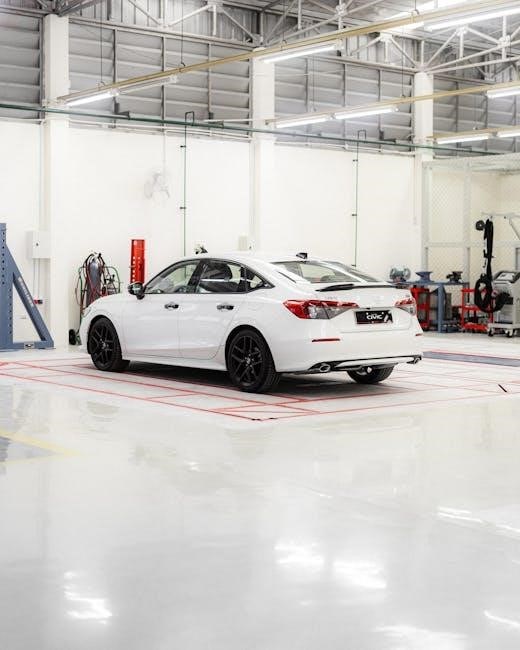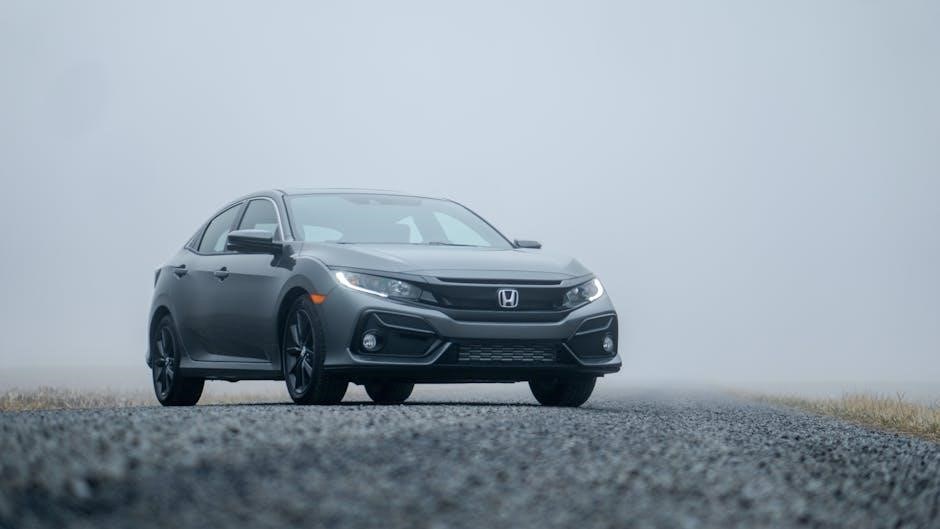The 2003 Honda Civic is a popular choice for drivers seeking reliability and fuel efficiency. Its 5-speed manual transmission offers smooth control, paired with a responsive 1.7L engine.
Engine and Performance
The 2003 Honda Civic has a 1.7L inline-4 engine, producing 115 horsepower and 110 lb-ft of torque. Its 5-speed manual transmission offers smooth shifting and efficient VTEC performance.
2.1 Engine Specifications
The 2003 Honda Civic is equipped with a 1.7-liter inline-4 cylinder engine, delivering 115 horsepower at 6,100 rpm and 110 lb-ft of torque at 4,500 rpm. The SOHC (Single Overhead Camshaft) design with 16 valves ensures efficient combustion and smooth operation. Paired with the 5-speed manual transmission, the engine provides excellent responsiveness and control. The VTEC (Variable Valve Timing and Lift Electronic Control) technology enhances performance at higher rpm while maintaining low-end torque for everyday driving. This combination results in a balanced power delivery, making the Civic suitable for both city commuting and highway cruising. The engine’s compact design and fuel-efficient nature contribute to its reputation for reliability and affordability. With proper maintenance, the 1.7L engine delivers consistent performance and durability, making it a standout choice in its class.

Transmission Overview
The 2003 Honda Civic features a 5-speed manual transmission, offering precise control and smooth gear transitions. It pairs seamlessly with the 1.7L engine, enhancing fuel efficiency and driver engagement.
3.1 Gear Ratios
The 2003 Honda Civic’s 5-speed manual transmission features specific gear ratios designed for optimal performance and efficiency. The gear ratios are as follows: 3.14 for first gear, 1.87 for second, 1.24 for third, and 0.97 for fourth, with the fifth gear ratio not specified in the provided data. These ratios provide smooth acceleration and control, particularly in city driving conditions. The lower gears offer excellent pulling power, while the higher gears contribute to improved fuel efficiency at higher speeds. This setup ensures a balanced driving experience, catering to both everyday commuting and occasional highway use. The precise gearing enhances the responsiveness of the 1.7L engine, making the 2003 Honda Civic a reliable choice for drivers who prefer manual control.
3.2 Benefits of Manual Transmission
The 2003 Honda Civic’s manual transmission offers several advantages, including better fuel efficiency and increased driver control. With a 5-speed manual, drivers can optimize gear shifts to suit their driving style, enhancing both performance and economy. Manual transmissions are generally lighter and less complex than automatics, reducing weight and improving responsiveness. This setup also allows for more precise control during acceleration, particularly in city driving or hilly terrain. Additionally, manual transmissions often require less maintenance and are less expensive to repair compared to automatics. For drivers who enjoy an engaging driving experience, the manual transmission in the 2003 Honda Civic provides a more direct connection to the vehicle, making it a preferred choice for those who value both efficiency and driver involvement.
3.3 Comparison with Automatic Transmission
The 2003 Honda Civic offers both manual and automatic transmission options, each catering to different driving preferences. The manual transmission provides better fuel efficiency and more driver engagement, making it ideal for those who enjoy precise control. In contrast, the automatic transmission offers convenience and ease, particularly in heavy traffic or hilly terrain, where constant gear shifting is less desirable. While the manual transmission delivers superior acceleration and responsiveness, the automatic ensures smoother transitions between gears. Maintenance costs for manual transmissions are generally lower, while automatics provide a more relaxed driving experience. Ultimately, the choice between the two depends on the driver’s lifestyle and priorities, with the manual appealing to enthusiasts and the automatic suiting those seeking comfort and simplicity. Both options maintain the Civic’s reputation for reliability and performance.
Fuel Efficiency
The 2003 Honda Civic with a manual transmission is known for its impressive fuel efficiency, making it a practical choice for daily commuting and long-distance travel. Equipped with a 1.7-liter inline-4 engine, the Civic delivers an estimated 32-38 miles per gallon in the city and 38-44 miles per gallon on the highway. The manual transmission plays a significant role in optimizing fuel economy, as it allows drivers to control gear shifts precisely, reducing unnecessary fuel consumption. Compared to the automatic variant, the manual transmission model generally offers better mileage, especially in city driving conditions. This combination of a fuel-efficient engine and a well-tuned manual gearbox ensures that the 2003 Honda Civic remains a cost-effective and environmentally friendly option for drivers. Its reputation for reliability and low operating costs further enhances its appeal as a sensible vehicle choice.
Maintenance and Care
Regular fluid checks and transmission filter replacements are essential for maintaining the 2003 Honda Civic’s manual transmission. Proper lubrication ensures smooth gear operation and longevity. Timely maintenance prevents wear and enhances performance.
5.1 Fluid Check and Replacement
Regular fluid checks are crucial for the longevity of the 2003 Honda Civic’s manual transmission. The transmission fluid should be inspected for cleanliness and level, ensuring it meets Honda’s specifications. Old or degraded fluid can lead to gear wear and poor shifting. The recommended fluid type is Honda ATF DW-1, designed for smooth operation and heat resistance. Fluid replacement is typically recommended every 30,000 to 60,000 miles, depending on driving conditions. Additionally, the transmission filter should be replaced during fluid changes to prevent contaminants from affecting performance. Proper maintenance helps maintain smooth gear engagement, reduces wear on internal components, and ensures optimal performance. Neglecting fluid and filter changes can lead to premature transmission failure, emphasizing the importance of regular servicing. Always consult the owner’s manual or a professional mechanic for precise guidance.
5.2 Transmission Filter Replacement
The transmission filter in the 2003 Honda Civic plays a vital role in ensuring clean fluid flows through the manual transmission system. It is generally recommended to replace the filter every 30,000 to 60,000 miles, depending on driving conditions. A dirty or clogged filter can lead to decreased performance, such as slow shifting or hesitation between gears. To replace the filter, locate it near the transmission pan, drain the fluid, and install a new filter. Always use a high-quality replacement filter designed for the 2003 Honda Civic. After replacement, refill the transmission with the recommended fluid type, such as Honda ATF DW-1, to maintain optimal performance. Regular filter replacements help prevent contamination and extend the lifespan of the transmission. Neglecting this step can lead to costly repairs, making it a critical part of routine maintenance.
Common Issues and Solutions
The 2003 Honda Civic with a manual transmission can experience certain issues over time. One common problem is worn-out synchronizers, which can cause difficulty shifting gears, especially when moving into higher gears. This issue can be addressed by replacing the affected synchronizers or the entire transmission assembly. Another issue is gear grinding, often due to clutch wear or improper driving habits. Replacing the clutch and ensuring proper driving techniques can resolve this. Additionally, some owners report leaks from the transmission pan or axle seals, which can be fixed by replacing the faulty gaskets or seals. Regular maintenance, such as fluid checks and filter replacements, can help prevent these issues. Addressing these problems early ensures smooth performance and extends the lifespan of the manual transmission.

Performance and Handling
The 2003 Honda Civic with a manual transmission delivers responsive acceleration and agile handling. Its 1.7L engine produces 115 horsepower, offering a balance of power and fuel efficiency. The 5-speed manual enhances driving engagement, making it a joy for enthusiasts.
7.1 Acceleration and Speed
The 2003 Honda Civic with a manual transmission delivers impressive acceleration for its class. Equipped with a 1.7L inline-4 engine producing 115 horsepower and 110 lb-ft of torque, it accelerates smoothly from 0-60 mph in approximately 9.2 seconds. The 5-speed manual transmission allows precise control over gear shifts, maximizing responsiveness and driver engagement. Its lightweight design, with a curb weight of around 2,400 pounds, contributes to agile performance and nimble handling. The car’s power delivery is linear, making it ideal for both city driving and highway cruising. While not designed for high-speed racing, the Civic’s balance of acceleration and fuel efficiency makes it a practical yet enjoyable choice for everyday driving. The manual transmission enhances the driving experience, offering a direct connection to the engine’s power.
7.2 Brakes and Suspension
The 2003 Honda Civic features a reliable braking system designed for safety and control. It is equipped with ventilated disc brakes in the front and drum brakes at the rear, providing consistent stopping power. The suspension system includes a MacPherson strut setup in the front and a torsion beam configuration in the rear, ensuring a smooth ride and responsive handling. This combination allows the Civic to navigate uneven roads comfortably while maintaining stability during sharp turns. The front-wheel-drive layout enhances traction, and the suspension’s tuning strikes a balance between comfort and sportiness. These components work together to deliver a driving experience that is both safe and enjoyable, making the Civic a practical choice for daily use. The braking and suspension systems are well-suited for the car’s weight and engine capabilities, contributing to its overall reliability.
Towing Capacity
The 2003 Honda Civic has a braked towing capacity of 1200kg, making it suitable for light towing tasks such as small trailers or boats. This capability is consistent across both sedan and hatchback models, providing versatility for owners with occasional towing needs. The manual transmission, paired with the 1.7L engine, ensures smooth control and adequate power delivery for towing. However, it is important to note that the Civic is not designed for heavy-duty towing, and exceeding the recommended limit can strain the engine and transmission. Always consult the owner’s manual for specific guidelines to ensure safe and efficient towing. This moderate towing capacity complements the Civic’s practical nature, offering a balance between everyday usability and occasional utility.

Tire Specifications
The 2003 Honda Civic comes equipped with 185/70R14 tires, providing a balance of comfort and handling. These tires are designed to optimize the vehicle’s fuel efficiency and performance, especially when paired with the manual transmission. The Civic’s wheel specifications are compatible with a variety of tire brands, ensuring flexibility for drivers. Proper tire maintenance is essential to maintain the vehicle’s overall performance and safety. Owners are advised to use tires that match the recommended size to ensure optimal braking, cornering, and acceleration. The combination of the manual transmission and the standard tire size enhances the Civic’s responsiveness, making it a reliable choice for both city and highway driving. Regular tire checks and rotations are recommended to prolong the lifespan of the tires and maintain the vehicle’s efficiency.
Safety Features
The 2003 Honda Civic prioritizes safety with a range of standard features. It includes dual front airbags, which provide protection for both the driver and passenger in the event of a collision. The vehicle also features anti-lock braking system (ABS), enhancing control during hard braking to prevent skidding. A rigid body structure helps absorb and distribute impact forces, ensuring passenger safety. Additionally, the Civic is equipped with three-point seatbelts for all occupants and rear child safety locks for added protection. The manual transmission model maintains a focus on driver control, which can contribute to safer driving practices. While the safety features were advanced for its time, modern standards have since evolved, but the 2003 Civic remains a reliable choice for those prioritizing simplicity and dependability.
Interior and Features
The 2003 Honda Civic offers a practical and comfortable interior, designed for everyday driving. The cabin features cloth upholstery and manually adjustable seats, providing a no-frills yet functional environment. The dashboard is clean and straightforward, with an AM/FM radio and CD player for entertainment. The manual transmission model includes a five-speed shifter, adding a sporty touch to the driving experience. Key features such as power steering and front disc brakes enhance control and responsiveness. The interior also includes storage options like door pockets and a center console, ensuring convenience for passengers. The 2003 Civic strikes a balance between simplicity and functionality, making it a reliable choice for drivers seeking a hassle-free ownership experience. Its interior design reflects the minimalist approach of its era, prioritizing usability over luxury.

Exterior Design
The 2003 Honda Civic features a sleek and compact exterior design, available in both sedan and hatchback body types. The sedan boasts a conservative yet timeless look, while the hatchback offers a sportier appearance. The front grille is simple, with a chrome Honda emblem, and the headlights are rounded for a soft, aerodynamic profile. The overall dimensions, including a wheelbase of 2,620 mm, provide a balanced stance. The 2003 Civic also features steel wheels with hubcaps and tires sized at 185/70, ensuring a practical and fuel-efficient drive. The exterior design emphasizes functionality and reliability, appealing to drivers who value simplicity and durability. Its compact size makes it ideal for urban environments, while its clean lines ensure a modern look that has aged well.

Reliability and Durability
The 2003 Honda Civic is renowned for its exceptional reliability and durability, making it a favorite among long-term owners. The 1.7L inline-4 engine, paired with the 5-speed manual transmission, is known for its robust construction and minimal mechanical issues. Honda’s reputation for building dependable vehicles shines through in this model, with many owners reporting high mileage without major repairs. The manual transmission, in particular, is praised for its smooth operation and long lifespan with proper maintenance. Regular fluid changes and inspections further enhance the car’s durability. Its simple design and lack of complex components contribute to its reliability, ensuring it remains a practical choice for daily driving. Over the years, the 2003 Civic has proven to be a trustworthy companion, offering years of trouble-free service and solidifying its reputation as a durable vehicle.
Cost of Ownership
The 2003 Honda Civic with a manual transmission is known for its affordable cost of ownership. Its fuel efficiency, with an estimated 32 mpg in the city and 38 mpg on the highway, helps reduce fuel expenses. The manual transmission itself is cost-effective, as it typically requires less maintenance than automatic transmissions. Insurance costs for the Civic are generally lower due to its modest value and strong safety record. Additionally, the car’s reliability means fewer unexpected repair bills, further lowering ownership costs. Routine maintenance, such as fluid changes and filter replacements, is inexpensive and straightforward. Overall, the 2003 Honda Civic offers a budget-friendly ownership experience, making it a practical choice for drivers seeking a dependable vehicle without high operational costs. Its combination of efficiency, durability, and affordability ensures long-term savings for owners.

Environmental Impact (Hybrid Model)
The 2003 Honda Civic Hybrid represents a significant step toward eco-friendly driving, combining a compact gasoline engine with an electric motor for reduced emissions and improved fuel efficiency. While the hybrid model is paired with an automatic transmission rather than a manual one, its environmental impact remains a key focus. The hybrid system ensures lower emissions, with the electric motor assisting during acceleration and deceleration to minimize fuel consumption. This results in a more environmentally friendly vehicle compared to non-hybrid models. The Civic Hybrid achieves an impressive fuel economy, further reducing its carbon footprint. Its innovative design makes it a greener choice for drivers looking to balance performance with sustainability. The hybrid model’s efficiency and lower emissions contribute to a reduced environmental impact, aligning with growing concerns about climate change and air quality.
Upgrades and Modifications
The 2003 Honda Civic with a manual transmission offers ample opportunities for upgrades and modifications to enhance performance and personalization. Owners often opt for lightweight alloy wheels and high-performance tires to improve handling and aesthetics. Suspension upgrades, such as coilovers, are popular for better ride quality and lowered stance; Engine modifications include installing a cold air intake or performance exhaust to increase horsepower and torque. For the manual transmission, enthusiasts may upgrade to shorter gear ratios or a performance clutch for smoother shifts and faster acceleration. Interior upgrades like sport seats or a racing steering wheel add a touch of style and functionality. Exterior modifications, such as body kits or spoilers, can enhance aerodynamics and visual appeal. These upgrades allow drivers to tailor their Civic to their driving preferences, making it a versatile and customizable vehicle.
Replacement Costs
Replacement costs for the 2003 Honda Civic manual transmission can vary depending on the specific component and labor rates. A new transmission filter typically costs between $10 and $30, while a replacement clutch kit can range from $300 to $600. If the entire manual transmission needs to be replaced, prices can start at around $1,500 for a refurbished unit and go up to $3,000 or more for a brand-new one. Labor costs for installation often add another $300 to $600, depending on the mechanic or repair shop. It’s important to source parts from reputable suppliers to ensure quality and compatibility. Regular maintenance, such as fluid checks and filter replacements, can help prevent costly repairs down the road. Budgeting for these expenses is essential for long-term ownership of the vehicle.
Driving Experience
The 2003 Honda Civic with a manual transmission delivers a responsive and engaging driving experience, making it a favorite among enthusiasts. The 5-speed manual gearbox offers smooth, precise shifts, providing drivers with a sense of control and connection to the road. Paired with the 1.7L inline-4 engine, the car feels lively and energetic, especially in urban environments. While not overwhelmingly powerful, the Civic’s lightweight design and well-tuned suspension make it agile and fun to handle. Braking is confident, thanks to its front disc and rear drum setup, while the steering offers good feedback. Whether navigating tight city streets or cruising on the highway, the Civic’s manual transmission enhances the overall driving experience, making it a joy for those who appreciate the simplicity and involvement of a stick shift.

Comparison with Other Models
The 2003 Honda Civic with a manual transmission stands out in its class for its balance of efficiency and performance. Compared to the Toyota Corolla, the Civic offers a more engaging driving experience due to its responsive manual gearbox and slightly higher power output. The Ford Focus of the same era, while fun to drive, lacks the Civic’s reliability and fuel efficiency. Similarly, the Mazda3 provides a sportier feel but falls short in terms of overall practicality. The Civic’s 5-speed manual transmission is also smoother and more refined than the Hyundai Elantra’s 5-speed unit. While not the most powerful in its segment, the Civic’s combination of economy, reliability, and drivability makes it a strong contender among compact cars of its time. Its reputation for durability further solidifies its position as a top choice for budget-conscious drivers.
Owner Reviews and Feedback
Owners of the 2003 Honda Civic with a manual transmission consistently praise its smooth-shifting gearbox and responsive acceleration. Many highlight the fuel efficiency, with some reporting over 30 MPG in city driving. The manual transmission is often described as intuitive and engaging, making it a joy for drivers who prefer control. Reliability is another key feature, with numerous owners clocking high mileage without major issues. Some note that the clutch pedal can feel light, but this is seen as a benefit for city driving. A few owners mention the engine’s modest power, but overall, the balance of performance and economy is widely appreciated. Feedback also emphasizes the car’s low maintenance costs and durability, making it a practical choice for everyday use.
The 2003 Honda Civic with a manual transmission stands out as a reliable and efficient vehicle, offering a blend of performance and practicality. Its smooth-shifting 5-speed manual gearbox paired with the responsive 1.7L engine provides an engaging driving experience. Owners praise its fuel efficiency, with many achieving over 30 MPG, making it a cost-effective choice for daily commuting. The car’s durability and low maintenance costs further enhance its appeal. While some may find the engine’s power modest, the overall balance of economy and responsiveness makes it a standout option. For those seeking a dependable and enjoyable ride, the 2003 Honda Civic with a manual transmission remains a solid choice, combining reliability, efficiency, and driving satisfaction.
Final Thoughts
The 2003 Honda Civic with a manual transmission is a timeless choice for drivers who value both practicality and driving enjoyment. Its 5-speed manual gearbox delivers smooth and precise shifts, complementing the 1.7L engine’s responsive performance. With excellent fuel efficiency and reliable engineering, this car has proven to be a dependable option for daily use. The manual transmission enhances driver engagement, making it a favorite among enthusiasts. While it may not boast the highest power output, its balance of efficiency, affordability, and driving satisfaction makes it a standout in its class. For those seeking a cost-effective and enjoyable ride, the 2003 Honda Civic with a manual transmission remains a smart and satisfying choice.
References
The information provided is based on data from various sources, including official Honda publications, automotive websites, and enthusiast forums. Specific details about the 2003 Honda Civic manual transmission were gathered from trusted resources such as Honda service manuals, parts catalogs, and reviews from reputable automotive platforms. Additionally, forums and communities dedicated to Honda Civic owners provided insights into real-world performance, maintenance, and driver experiences. These references ensure the accuracy and relevance of the information presented, offering a comprehensive overview of the 2003 Honda Civic with a manual transmission. By consolidating data from multiple sources, this guide aims to serve as a valuable resource for both current and prospective owners of this iconic vehicle.
